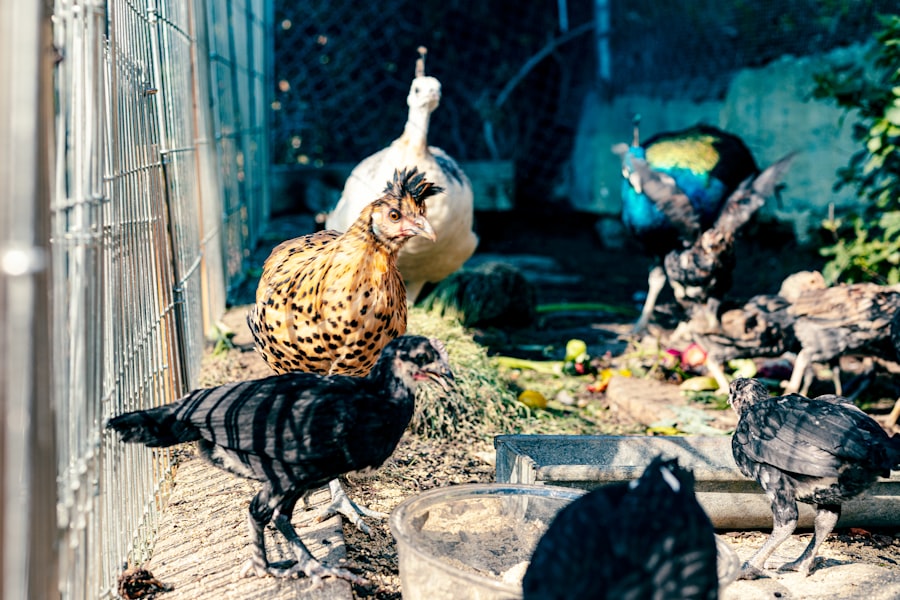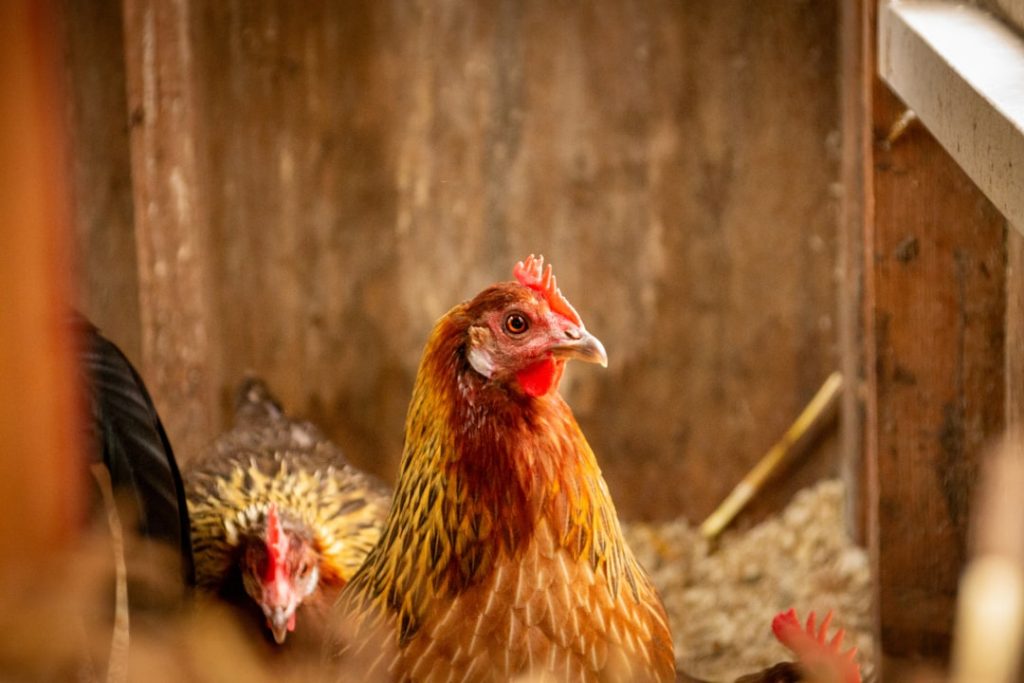Foxes are intelligent and adaptable predators that can pose a significant threat to chicken coops. These carnivorous mammals are known for their stealth, agility, and hunting skills, which enable them to access coops and prey on chickens effectively. Foxes are primarily nocturnal, meaning they are most active during nighttime hours when chickens are roosting and more vulnerable.
One of the key characteristics that make foxes successful predators is their opportunistic feeding behavior. They will readily take advantage of any available food source, including domestic poultry. This tendency makes chicken coops particularly attractive targets for foxes searching for an easy meal.
Foxes possess physical attributes that enhance their ability to access chicken coops. They are skilled diggers, capable of burrowing under fences and other barriers. Additionally, foxes are adept climbers, allowing them to scale obstacles and reach elevated areas.
Their acute sense of smell enables them to detect the presence of chickens from a considerable distance, further complicating efforts to keep them away. The combination of intelligence, adaptability, and physical capabilities makes foxes formidable opponents when it comes to protecting chickens. Their nocturnal habits, hunting prowess, and ability to overcome various obstacles present significant challenges for poultry keepers.
Understanding these behaviors and characteristics is essential for developing effective strategies to safeguard chicken coops and protect flocks from fox predation.
Table of Contents
- 1 Securing Your Chicken Coop: Tips for Fox-Proofing
- 2 Deterrents and Repellents: Natural Ways to Keep Foxes Away
- 3 Keeping a Watchful Eye: Monitoring Your Chickens’ Safety
- 4 Creating a Safe Haven: Providing Shelter and Hiding Places for Your Chickens
- 5 Seeking Professional Help: Hiring a Wildlife Control Expert
- 6 Living in Harmony: Coexisting with Foxes in Your Area
- 7 FAQs
- 7.1 What are some effective methods for keeping foxes away from chickens?
- 7.2 What should I do if I suspect a fox is targeting my chickens?
- 7.3 Are there any natural deterrents that can help keep foxes away from chickens?
- 7.4 What are some signs that a fox may be targeting my chickens?
- 7.5 Is it legal to trap or kill foxes to protect my chickens?
Key Takeaways
- Foxes are intelligent and adaptable predators that pose a threat to chickens, especially during the night.
- Secure your chicken coop by using sturdy materials, burying wire mesh, and installing motion-activated lights or alarms.
- Natural deterrents like citrus peels, ammonia-soaked rags, and predator urine can help keep foxes away from your chickens.
- Regularly monitor your chickens’ safety by checking for signs of fox activity and reinforcing any weak spots in your coop.
- Provide shelter and hiding places for your chickens within the coop to help them evade fox attacks.
- Consider hiring a wildlife control expert if foxes continue to pose a threat to your chickens despite your efforts.
- Coexisting with foxes in your area is possible by implementing preventive measures and respecting their natural behavior.
Securing Your Chicken Coop: Tips for Fox-Proofing
Building a Secure Coop
One of the first steps in fox-proofing your coop is to ensure that it is built with sturdy materials and secure fencing. Use hardware cloth with small openings to prevent foxes from squeezing through or digging under the fencing. Bury the fencing at least 12 inches underground to deter digging, and consider adding an outward-facing overhang to prevent climbing.
Fortifying the Coop
In addition to secure fencing, it’s important to fortify the coop itself. Make sure all doors and windows are securely latched, and consider adding locks or predator-proof latches for extra security.
Maintenance and Deterrents
Keep the coop clean and free of any food scraps or debris that may attract foxes, and consider installing motion-activated lights or alarms to deter nocturnal predators. By taking these precautions, you can significantly reduce the risk of a fox gaining access to your chickens.
Deterrents and Repellents: Natural Ways to Keep Foxes Away

In addition to securing your coop, there are natural deterrents and repellents that can help keep foxes at bay. One effective method is to use scent-based deterrents such as predator urine or strong-smelling plants like lavender or mint around the perimeter of the coop. These scents can help mask the smell of your chickens and deter foxes from approaching.
You can also consider using motion-activated sprinklers or noise-making devices to startle and discourage foxes from coming near the coop. Another natural deterrent is the use of visual barriers such as tall grasses or shrubs around the coop to obstruct the view of potential predators. This can make it more difficult for foxes to spot your chickens and may discourage them from attempting to access the coop.
By combining these natural deterrents with secure fencing and a well-built coop, you can create a strong defense against foxes and other predators. Natural deterrents and repellents can be effective in keeping foxes away from your chicken coop. Scent-based deterrents such as predator urine or strong-smelling plants like lavender or mint can help mask the smell of your chickens and deter foxes from approaching.
Motion-activated sprinklers or noise-making devices can also startle and discourage foxes from coming near the coop. Visual barriers such as tall grasses or shrubs around the coop can obstruct the view of potential predators, making it more difficult for foxes to spot your chickens and discouraging them from attempting to access the coop. By combining these natural deterrents with secure fencing and a well-built coop, you can create a strong defense against foxes and other predators.
Keeping a Watchful Eye: Monitoring Your Chickens’ Safety
Regular monitoring of your chickens’ safety is crucial in preventing fox attacks. Keep a close eye on your flock during the day, especially during times when they are let out to free-range. Look for any signs of disturbance around the coop, such as tracks or droppings, which may indicate that a fox has been lurking nearby.
It’s also important to inspect the perimeter of the coop regularly for any signs of digging or attempts to breach the fencing. Consider installing security cameras around the coop to keep a constant watch on your chickens, especially during the night when foxes are most active. This will allow you to quickly detect any potential threats and take action to protect your flock.
By staying vigilant and monitoring your chickens’ safety, you can proactively prevent fox attacks and ensure the well-being of your flock. Regular monitoring of your chickens’ safety is essential in preventing fox attacks. Keep a close eye on your flock during the day, especially when they are let out to free-range, and look for any signs of disturbance around the coop, such as tracks or droppings, which may indicate that a fox has been lurking nearby.
Regularly inspect the perimeter of the coop for any signs of digging or attempts to breach the fencing, and consider installing security cameras around the coop to keep a constant watch on your chickens, especially during the night when foxes are most active. By staying vigilant and monitoring your chickens’ safety, you can proactively prevent fox attacks and ensure the well-being of your flock.
Creating a Safe Haven: Providing Shelter and Hiding Places for Your Chickens
Creating a safe haven for your chickens is essential in protecting them from fox attacks. Provide ample shelter within the coop for your chickens to roost safely at night, away from potential predators. Ensure that the coop is well-ventilated and insulated to keep your flock comfortable while also keeping predators out.
Consider adding hiding places such as dense shrubbery or brush piles within the chicken run where your chickens can seek refuge if they sense danger. In addition to shelter within the coop, it’s important to provide hiding places in the outdoor area where your chickens roam. This can include natural cover such as bushes or trees, as well as artificial structures like tunnels or hiding boxes.
These hiding places can give your chickens a safe retreat if a fox were to approach, increasing their chances of evading an attack. By creating a safe haven with ample shelter and hiding places, you can significantly reduce the risk of fox predation on your flock. Creating a safe haven for your chickens is crucial in protecting them from fox attacks.
Provide ample shelter within the coop for your chickens to roost safely at night, away from potential predators, ensuring that it is well-ventilated and insulated to keep your flock comfortable while also keeping predators out. Consider adding hiding places such as dense shrubbery or brush piles within the chicken run where your chickens can seek refuge if they sense danger. In addition to shelter within the coop, provide hiding places in the outdoor area where your chickens roam, including natural cover such as bushes or trees, as well as artificial structures like tunnels or hiding boxes.
These hiding places can give your chickens a safe retreat if a fox were to approach, increasing their chances of evading an attack.
Seeking Professional Help: Hiring a Wildlife Control Expert

Expert Solutions for Fox Deterrents
These professionals have experience in dealing with predator problems and can provide valuable insight into effective deterrents and repellents specific to foxes in your area. They can assess your coop and property for vulnerabilities that may be attracting foxes and offer solutions for fortifying them.
Safe and Humane Removal of Nuisance Foxes
Wildlife control experts can also assist in safely removing any nuisance foxes from your property if necessary. They have the knowledge and tools to trap and relocate problem animals without causing harm to them or other wildlife in the area.
Peace of Mind with Professional Help
By enlisting the help of a wildlife control expert, you can gain peace of mind knowing that you are taking proactive steps to protect your chickens while also ensuring the humane treatment of local wildlife.
Living in Harmony: Coexisting with Foxes in Your Area
While protecting your chickens from foxes is important, it’s also possible to coexist with these wild animals in harmony. Foxes play an important role in controlling rodent populations and maintaining ecological balance in their natural habitats. By implementing effective deterrents and securing your chicken coop, you can minimize conflicts with foxes while still allowing them to thrive in their environment.
It’s important to remember that coexisting with wildlife requires mutual respect and understanding. Avoid leaving out food scraps or garbage that may attract foxes, and be mindful of any potential den sites on your property that could be inhabited by foxes. By taking these steps, you can create a harmonious relationship with foxes while also protecting your chickens from harm.
While protecting your chickens from foxes is important, it’s also possible to coexist with these wild animals in harmony. Foxes play an important role in controlling rodent populations and maintaining ecological balance in their natural habitats. By implementing effective deterrents and securing your chicken coop, you can minimize conflicts with foxes while still allowing them to thrive in their environment.
Coexisting with wildlife requires mutual respect and understanding; avoid leaving out food scraps or garbage that may attract foxes, and be mindful of any potential den sites on your property that could be inhabited by foxes. By taking these steps, you can create a harmonious relationship with foxes while also protecting your chickens from harm. In conclusion, protecting your chickens from fox predation requires a multi-faceted approach that includes understanding the behavior of foxes, securing your chicken coop, using natural deterrents, monitoring your chickens’ safety, providing shelter and hiding places, seeking professional help if needed, and coexisting with foxes in harmony.
By implementing these strategies, you can create a safe environment for your flock while also respecting the role of foxes in their natural habitat. With vigilance and proactive measures, you can successfully protect your chickens from these cunning predators while promoting a balanced ecosystem in your area.
If you’re struggling with keeping your chickens safe from predators like foxes, you may want to consider upgrading your chicken coop. Hannah Montana Chicken Coop offers some great tips on how to secure your coop and keep your chickens safe from harm. Check out their article here for more information on how to protect your flock.
FAQs
What are some effective methods for keeping foxes away from chickens?
Some effective methods for keeping foxes away from chickens include installing secure fencing, using motion-activated lights or sprinklers, and keeping guard animals such as dogs or llamas.
What should I do if I suspect a fox is targeting my chickens?
If you suspect a fox is targeting your chickens, it’s important to take proactive measures to protect your flock. This may include reinforcing your coop and run, using deterrents, and removing any potential food sources that may attract the fox.
Are there any natural deterrents that can help keep foxes away from chickens?
Yes, there are natural deterrents that can help keep foxes away from chickens. Some examples include using strong-smelling substances like garlic or predator urine, as well as planting thorny bushes or creating noise disturbances around the coop.
What are some signs that a fox may be targeting my chickens?
Some signs that a fox may be targeting your chickens include finding feathers or carcasses near the coop, observing unusual behavior in your chickens, and noticing tracks or other evidence of a predator in the area.
Is it legal to trap or kill foxes to protect my chickens?
Laws regarding trapping or killing foxes vary by location, so it’s important to check with local authorities to determine the legality of these actions. In some areas, permits may be required to trap or kill foxes, while in others, it may be illegal altogether.
Meet Walter, the feathered-friend fanatic of Florida! Nestled in the sunshine state, Walter struts through life with his feathered companions, clucking his way to happiness. With a coop that’s fancier than a five-star hotel, he’s the Don Juan of the chicken world. When he’s not teaching his hens to do the cha-cha, you’ll find him in a heated debate with his prized rooster, Sir Clucks-a-Lot. Walter’s poultry passion is no yolk; he’s the sunny-side-up guy you never knew you needed in your flock of friends!







